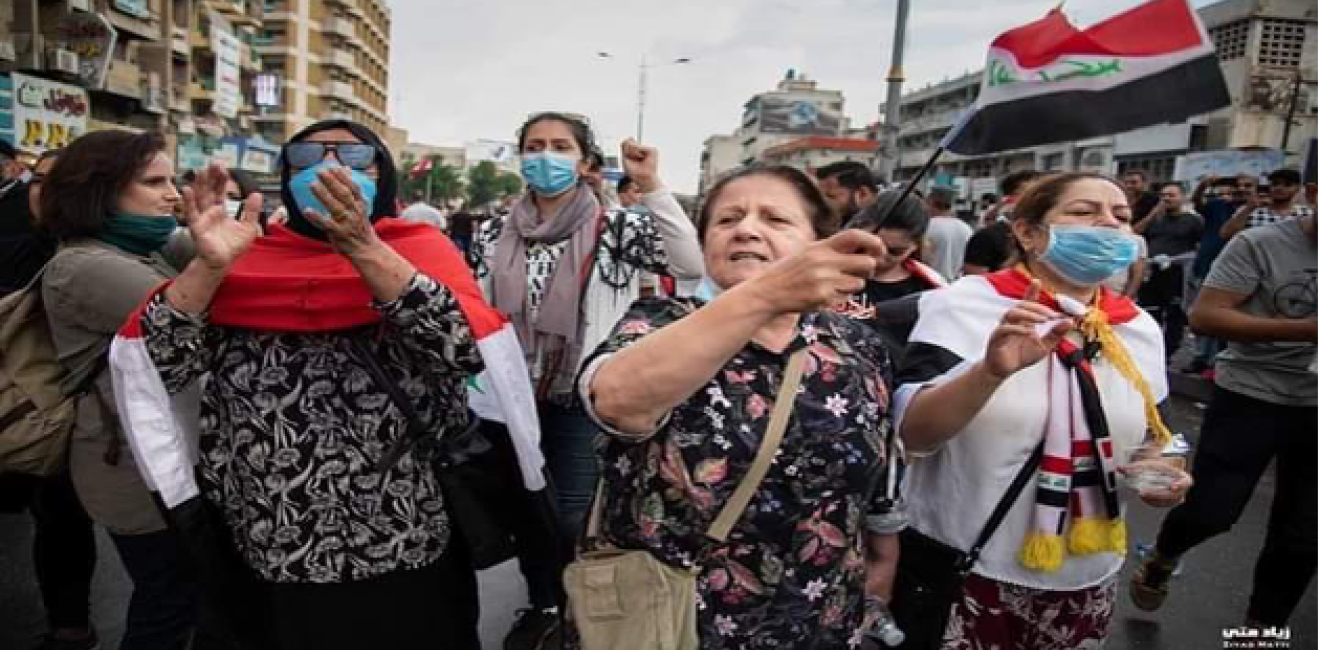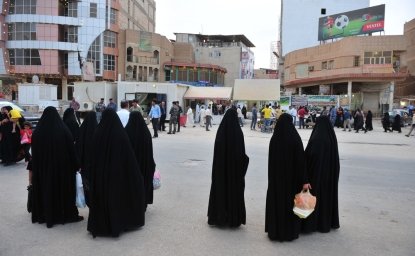In 2018, several dozen women attended a training at the American consulate in Basra, Iraq—only to receive death threats days later. Reham Yacoub was one of them. A doctor and activist, Reham was known for organizing local protests since 2018. Naturally, like many other professional women, she became a frequent protester during the Tishreen (October) protest movement that swept Iraq in 2019, demanding social justice and governance reform. Targeted killing became a common tactic used against protesters; Reham was also met with the threat of assassination.
On August 19, 2020, Reham Yacoub was shot and killed by a gunman in the back of a motorcycle—silenced for her role in organizing protests and speaking out for Iraqi women’s rights and political change.
As the protests carried into 2020, the health and economic impacts of Covid-19 tamped down on public demonstrations, but hundreds kept coming out on the street. Ultimately, it was one of her countrymen, not a deadly disease, that took her life. On August 19, 2020, Reham Yacoub was shot and killed by a gunman in the back of a motorcycle—silenced for her role in organizing protests and speaking out for Iraqi women’s rights and political change.
The October 2019 protests in Iraq
Protests erupted in Iraq on October 1, 2019, when Shia-born Abdel-Wahab al-Saadi, second-in-command of the Iraqi Counter-Terrorism Service to the Ministry of Defense, was removed from his post. The decision was viewed as unjust and nepotistic, aggravating pre-existing frustrations in Iraq over systemic corruption, financial instability, and sectarianism between Sunni and Shia. A major wave of protest ignited on October 25, after initial demonstrations were suppressed by government forces on October 9.
Ruba Ali Al-Hassani, a legal sociologist, published a three-part article in Inside Arabia that argued corruption in Iraq is a significant factor in the October Revolution. She added that women in particular took to the streets due to systemic oppression of women, in addition to political mismanagement and a lack of accountability. The topic of women’s rights is particularly controversial and perpetrators of gender-based violence, mostly men, are rarely held accountable. Women activists in 2019 used Twitter as a platform to inspire Iraqis to mobilize for reform. They not only helped to organize protests, but also supplied food and medical care to those on the ground.
After the pandemic hit, activists continued to leverage social media platforms to mobilize Iraqis online and keep the reform agenda at the forefront of Iraqi’s minds. These online activists worked with advocates on the ground, such as Reham, to propose a list of demands to the Iraqi government. Reham represented the Iraqi women who fought for these issues – and those who were silenced for speaking out. Social media helped to maintain the momentum they gained in October of 2019.
These concerning trends increased the urgency for advocating for women’s empowerment and an end to abuse. Women from myriad backgrounds and locales participated in the protests and online campaigns.
The pandemic also further elevated awareness about the inequality women face. Women were forced into marriage earlier and younger, psychological and emotional abuse occurred more frequently, and the rate of intimate partner violence skyrocketed. Gender-based violence perpetrated online increased by 7.4 percent as well. These concerning trends increased the urgency for advocating for women’s empowerment and an end to abuse. Women from myriad backgrounds and locales participated in the protests and online campaigns. Members of the Iraqi diaspora like Laila al-Zwaini, Shahad al-Rawi, Balsam Mustafa and Ruba Ali Al-Hassani helped garner the attention of the international community.
Assassinations continue, and so do the protests
Many female protesters living and protesting in Basra in 2019 and 2020 were met with attempted and successful assassinations. Shahad Al-Rawi, who left Iraq when she was 16 years old, Tweeted about several assassinations that occurred earlier in the protests, urging the government and security forces to put an end to counter-protest brutality. Reham’s assassination in August 2020 inspired the hashtag #ريهام_يعقوب(#Rehab_Yacoub) on Twitter to bring attention to the dangers that women protesters face and the causes for which they fought. Laila al-Zwaini spoke out about Reham’s death, arguing that if Iraqis do not continue to fight, they will allow corruption to win.
The attention Reham Yacoub’s murder and other assassination gathered on social media contributed to the endurance of the October Revolution amid the pandemic. Although street demonstrations slowed, they did not stop. Reham’s story was particularly powerful because she was targeted so long after the pandemic began. The emotions inspired by the 2019 protests certainly did not dissipate, as the public outcry over Reham’s death indicates. Activists online continued to play an important role in maintaining the Iraqi public’s attention, in part by using videos and images from the 2019 protests. In July 2020, Ruba Ali Al-Hassani continued to Tweet about the assassination of women.

Iraqi elections in 2021
Iraq’s parliamentary elections took place on October 10, 2021, two years after the protests began. Due to the efforts of activists on social media, the original demands of the protests were still relevant leading up to the election. In one post from March 8, 2021, an Iraqi activist Tweeted an image of a mural painted in Baghdad honoring the women who resisted Iraq’s status quo. In July 2021, Baslam Mustafa Tweeted a chain about a prominent women’s rights activist who was assassinated. The attention these posts garnered helped sustain the calls for change. Women on Twitter encouraged others to vote and acknowledged that social media is a place to commemorate the October Movement.
Although the representation of women in Iraq’s parliamentary was not expected to change much, women continued to run for seats in the election. In 2019, 28 percent of candidates, or 92 seats were female, which is 3 percent greater than the required number of 83 seats. In the 2021 election, 97 seats were won by women, increasing their representation in parliament by 29.4 percent.
She did not let fearmongering and intimidation discourage her efforts to fight for change, nor did the pandemic dampen her spirit.
Several of these women leaders tweeted about the benefit of women in the government, but recognized it’s about the impact women can have, not just the number of seats they hold, that matters most. Women have tried to apply the 25 percent quota for parliamentary seats to other branches of the government, but these efforts ultimately failed. Reham Yacoub succeeded in drawing more attention to social justice by protesting throughout the pandemic. She did not let fearmongering and intimidation discourage her efforts to fight for change, nor did the pandemic dampen her spirit.
After the election results were finalized at the end of November, the government was accused of fraudulent results, but the streets were relatively silent. Nonetheless, women on social media took to Twitter, still urging for social justice reforms for women and promoting civic activism. There is more to be done for human rights for women in Iraq, but as social media continues to grow in the Middle East and play a role in linking protesters and causes together, accomplishments can be made, just as they were this year’s elections.
The views expressed in these articles are those of the author and do not reflect an official position of the Wilson Center.
Author


Middle East Program
The Wilson Center’s Middle East Program serves as a crucial resource for the policymaking community and beyond, providing analyses and research that helps inform US foreign policymaking, stimulates public debate, and expands knowledge about issues in the wider Middle East and North Africa (MENA) region. Read more


Middle East Women's Initiative
The Middle East Women's Initiative (MEWI) promotes the empowerment of women in the region through an open and inclusive dialogue with women leaders from the Middle East and continuous research. Read more

Explore More
Browse Insights & Analysis
Women are the Catalysts for Change in Lebanon



